Unfortunately, at the moment I cannot post all of my photos because I am writing from dodgy internet cafes in Cape Town, Poland, etc! However, rest assured they are coming soon as soon as I return to the US.
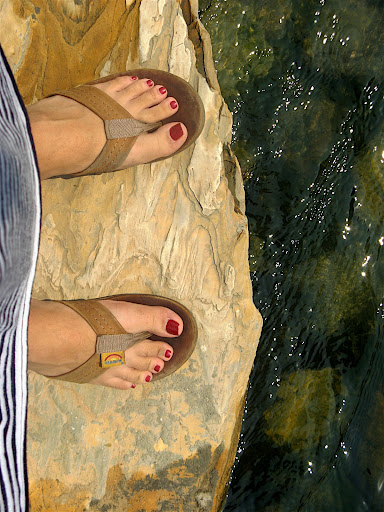 Lyrics: A room full of my friends, dancing round and round – Paulo Nutini
Lyrics: A room full of my friends, dancing round and round – Paulo Nutini
Beijing was an absolutely whirlwind trip. We took an overnight train there, stayed for two nights and left on the third day, on another overnight train. Roxy, Ami, Andrew, Nick, and I took Beijing by storm.
DAY 1: CONTROLLED CHAOS
The overnight train was incredible because we had given in and paid for the more expensive soft-sleeper beds. We arrived in Beijing in the early morning, only to be kicked out by a nervous attendant because we were the last people on the entire train. Thus, we found ourselves standing on the platform with our luggage, still wearing our pajamas! We made our way to the front of the train station, randomly met up with two Spaniards that looked more lost than we did, and proceeded to cut the hundred-people cab line by walking straight into oncoming traffic and hailing two cabs. Soon, we were at the Far East International Youth Hostel, unpacking in our 6-bunk-bed room and happy to see that there were multiple individual showers in the bathroom!
We immediately set out, taking the subway to the central lakes region of the city. The hutong district reveals the charm of old Beijing, with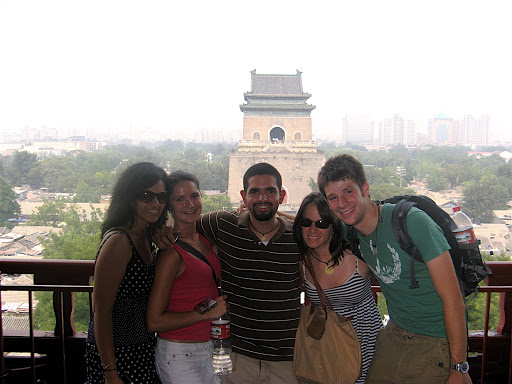 its alleyways, courtyard houses, and overlapping roofs. We walked around, admiring the miniature oasis in the middle of the capital, bought some ice cream, and proceeded to the Drum and Bell Towers. Walking up the steep stairs of the Drum Tower, we found ourselves overlooking the city and surrounded by the drums that were used, as far back as 1420, to mark the hours of the day. After this, we walked along the lakes, enjoying the presence of water and unaware that, the next day we’d return there to witness the city’s incredible nightlife. We finished the first part of the day by having lunch at an authentic – and delicious – Thai restaurant on the banks of one of the lakes.
its alleyways, courtyard houses, and overlapping roofs. We walked around, admiring the miniature oasis in the middle of the capital, bought some ice cream, and proceeded to the Drum and Bell Towers. Walking up the steep stairs of the Drum Tower, we found ourselves overlooking the city and surrounded by the drums that were used, as far back as 1420, to mark the hours of the day. After this, we walked along the lakes, enjoying the presence of water and unaware that, the next day we’d return there to witness the city’s incredible nightlife. We finished the first part of the day by having lunch at an authentic – and delicious – Thai restaurant on the banks of one of the lakes.
After this, we embarked on an adventure to the Temple of Heaven, more correctly known as Tian Tan. It is one of the largest and most famous temple complexes in all of China, as well as a paradigm of Chinese architectural balance and symbolism. The pillars represent the seasons, the circular roofs are meant to represent the sky, th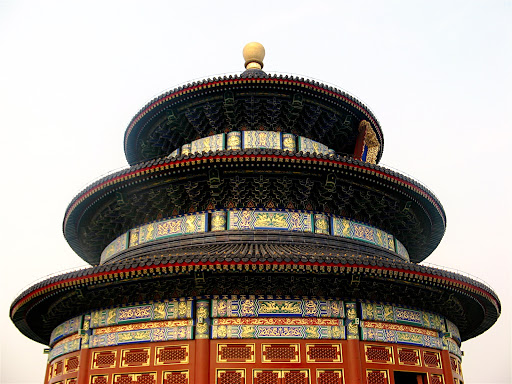 e dark red of the walls is meant to honor the emperor, the dragon and phoenix motifs represent Man and Woman, Emperor and Empress. The symmetry, sheer size, and design of the temple are absolutely breathtaking, not to mention the beauty of the tiers of carved marble stairs wrapped in a circle around it. Fun Fact: the entire main hall was built without using a single nail!
e dark red of the walls is meant to honor the emperor, the dragon and phoenix motifs represent Man and Woman, Emperor and Empress. The symmetry, sheer size, and design of the temple are absolutely breathtaking, not to mention the beauty of the tiers of carved marble stairs wrapped in a circle around it. Fun Fact: the entire main hall was built without using a single nail!
At the entrance to the park, we came across an incredibly humorous sign, the highlights of which I felt the need to recreate here:
4. Keep the park clean. Please don’t bring football, pets and watermelon, etc. into the park. No spitting. No leaking. No littering. Collecting rubbish and begging are prohibited.
6. Playing percussion is prohibited. Don’t make any noises which will disturb others.
7. Illegal dealings, superstitious activities and other lavatorial behaviors are prohibited. No peddling, no posters, no advertisement. Don’t make profits by teaching dances and other exercise. No gambling and other illegal activities.
8. …No fire in the none-fire areas.
9…..No dancing along the long corridor. Please don’t pick up plastic bottles or other rubbish, etc.
Tian Tan is incredibl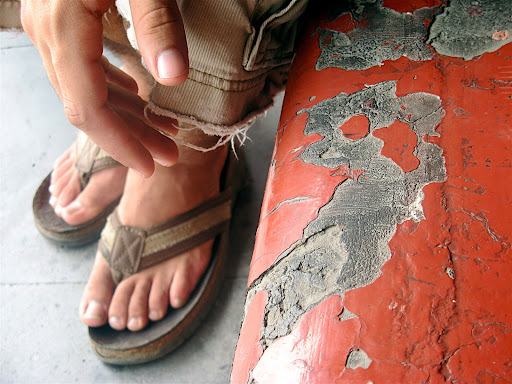 y beautiful, in part because of the elaborate and comprehensive restoration that it has undergone in recent years. We spent a while wandering the grounds, walking into some of the other buildings in the complex, and randomly running into other Harvard students, before Nick and I decided to head back. We had wanted to get some clothes tailored and took the opportunity to run off and get our measurements taken. However, after almost sprinting to the front of the complex, we uncovered that no taxi would take us back to our hostel. We settled for, of all things, a rickshaw, driven by a thin, crazy Chinese man who alternated between chanting, “Ole, Ole, ole…,” smoking while pedaling, and pointing to his back while making pained facial expressions so that we would pity him and agree to pay him more!! In short, he was hilarious, and the slow ride through Beijing’s streets, half getting run over, half laughing, was a truly enjoyable experience. As soon as we arrived, Nick and I rushed out to find a good tailor. We succeeded in our quest but I lost the courage to bargain with her because a.) she spoke very good English and b.) she was pregnant. An English speaking, pregnant, incredibly feisty Chinese tailor was not something I could handle. In the end, we agreed on prices so that Nick would get two suits and I could get a beautiful qipao [those traditional Chinese dresses for women]. It’s worth noting that we were coming to pick up our handmade outfits in less than two days!
y beautiful, in part because of the elaborate and comprehensive restoration that it has undergone in recent years. We spent a while wandering the grounds, walking into some of the other buildings in the complex, and randomly running into other Harvard students, before Nick and I decided to head back. We had wanted to get some clothes tailored and took the opportunity to run off and get our measurements taken. However, after almost sprinting to the front of the complex, we uncovered that no taxi would take us back to our hostel. We settled for, of all things, a rickshaw, driven by a thin, crazy Chinese man who alternated between chanting, “Ole, Ole, ole…,” smoking while pedaling, and pointing to his back while making pained facial expressions so that we would pity him and agree to pay him more!! In short, he was hilarious, and the slow ride through Beijing’s streets, half getting run over, half laughing, was a truly enjoyable experience. As soon as we arrived, Nick and I rushed out to find a good tailor. We succeeded in our quest but I lost the courage to bargain with her because a.) she spoke very good English and b.) she was pregnant. An English speaking, pregnant, incredibly feisty Chinese tailor was not something I could handle. In the end, we agreed on prices so that Nick would get two suits and I could get a beautiful qipao [those traditional Chinese dresses for women]. It’s worth noting that we were coming to pick up our handmade outfits in less than two days!
After our failed bargaining adventure but successful purchase of new garments, Nick and I ran back to th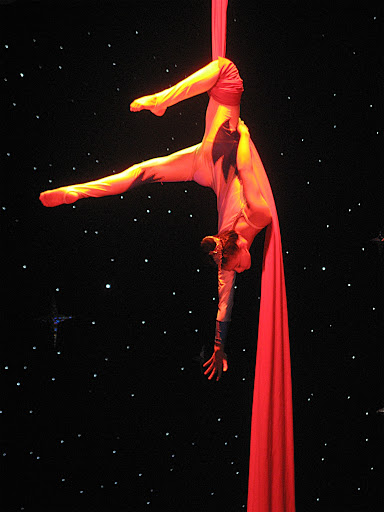 e hotel to change, meet the rest of the group, and head out to a Beijing Acrobatics Show. Renowned in China, these children are trained and housed in a special school from the age of three. All in all, the show was impressive from an acrobatic point of view. However for me, who had seen Cirque du Soleil in Shangahi several weeks earlier, it was more sad than impressive. Though many of the acts were extremely similar, their costumes looked old, their flags were tattered, their props were cheap and used, and, most strikingly, the children looked unhappy. Especially the older performers seemed to have a smile that was glued to their faces from performance to performance, but their expressions were glossed over and the corners of their eyes didn’t smile along with their mouth. I wondered for how long they would work with the troupe in a country where your future is decided so early. They hadn’t studied in school so what else could they do? After the performance, they were bussed off immediately and we headed off, having thoroughly enjoyed the show but with a nagging sour taste in our mouths.
e hotel to change, meet the rest of the group, and head out to a Beijing Acrobatics Show. Renowned in China, these children are trained and housed in a special school from the age of three. All in all, the show was impressive from an acrobatic point of view. However for me, who had seen Cirque du Soleil in Shangahi several weeks earlier, it was more sad than impressive. Though many of the acts were extremely similar, their costumes looked old, their flags were tattered, their props were cheap and used, and, most strikingly, the children looked unhappy. Especially the older performers seemed to have a smile that was glued to their faces from performance to performance, but their expressions were glossed over and the corners of their eyes didn’t smile along with their mouth. I wondered for how long they would work with the troupe in a country where your future is decided so early. They hadn’t studied in school so what else could they do? After the performance, they were bussed off immediately and we headed off, having thoroughly enjoyed the show but with a nagging sour taste in our mouths.
We headed over to Quanjude Roast Duck Restaurant. The cab ride to the famous 2,000 seating capacity restaurant was almost as fun as the meal. First, we fooled the cab driver by fitting five people in the cab, which is illegal in Beijing. Second, Ami kept stating “there are five people in this cab” every time there was a silence in the vehicle, causing the rest of us to combust into spontaneous laughter. Third, the driver, once he understood what restaurant we were interested in going to, proceeded to, at random moments, quack like a duck and laugh! In turn, we would echo his quacks and the cab sounded like a kindergarten classroom of wheels!
We arrived at the restaurant to find that it had closed fifteen minutes earlier. So we argued, shamelessly. We lied, claiming that it w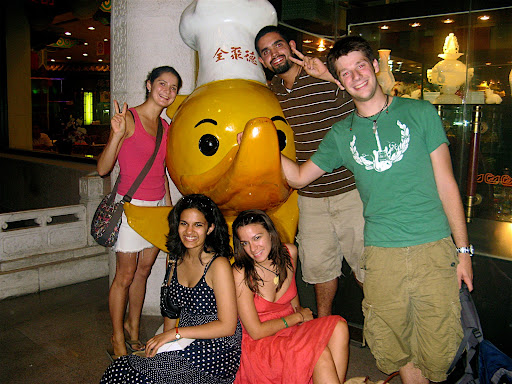 as our last night in Beijing, we begged and pleaded. In the end, Ami brilliantly busted out [there is no other verb for this] her Harvard id and claimed that we had been sent to evaluate the restaurant and see if we wanted to bring more Harvard students here on their next trip to Beijing. And, like some kind of magic wand, the doors opened. Though they claimed that they were only letting us in on the condition that we get a single duck, soon we ended up with three roasted ducks, 3 different servers, and a smiling manager. Five seconds before walking in, we also grabbed 3 Croatian tourists who were equally disappointed to have arrived late and added them to our group. And thus, the eight of us had a fabulous night eating one of China’s most famous roasted duck dishes! The family of Croatians, for whom the adjective “well off” was a euphemism, not only paid for most of the food, they also bought us wine! In the end, we even tried duck tongue, which, I must say, tasted no different than regular duck meat, despite the different texture.
as our last night in Beijing, we begged and pleaded. In the end, Ami brilliantly busted out [there is no other verb for this] her Harvard id and claimed that we had been sent to evaluate the restaurant and see if we wanted to bring more Harvard students here on their next trip to Beijing. And, like some kind of magic wand, the doors opened. Though they claimed that they were only letting us in on the condition that we get a single duck, soon we ended up with three roasted ducks, 3 different servers, and a smiling manager. Five seconds before walking in, we also grabbed 3 Croatian tourists who were equally disappointed to have arrived late and added them to our group. And thus, the eight of us had a fabulous night eating one of China’s most famous roasted duck dishes! The family of Croatians, for whom the adjective “well off” was a euphemism, not only paid for most of the food, they also bought us wine! In the end, we even tried duck tongue, which, I must say, tasted no different than regular duck meat, despite the different texture.
And so, we wrapped up a day of whirlwind Beijing sightseeing!
DAY 2: TOBOGGAN & SCORPION
We woke up at 5:30am to shower, eat a hurried “Taste of Home” breakfast, and meet in the hostel’s lobby. Four days from now we’d be in Chicago, and then, after twelve or thirteen or fourteen hours of travel, we’d each be off to New York, Washington, or, in my case, Key Largo with the family. I’d barely be loosing thirty minutes that day, flying against time, flying much faster than the dawning day, beating the night at its own game of choosing how and when to eclipse what. Though I appreciated the not-lost time, I was already resenting the flight. In airplanes, they always tell you when to sleep, or strongly suggest it by closing all the windows and dimming all the lights. And sleep, at least when crossing the Atlantic, is strangely contagious. I usually loose the game of resisting – except once as a kid when I succeeded in not peeing on a flight from Mexico City to Moscow – and I knew that the energy required to wage war against my eyelids for half a day’s worth of hours, to resist the psychological manipulation of the resourceful American Airlines staff, even as an adult, would be too much. I would fall asleep and would have to rely on Eric to wake me up when the meals came.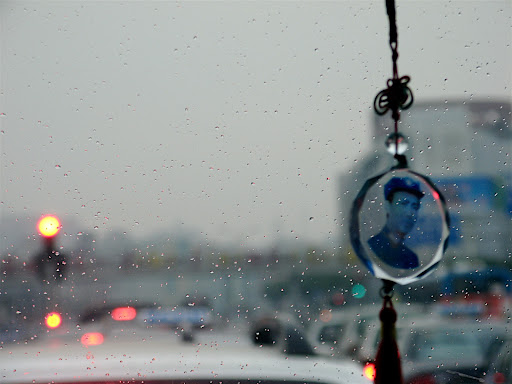
So we climbed, all eleven or twelve of us, into a small white van with no seatbelts. I stared at the droplets of water on the windshield and played with adjusting the focus of my eyes between them and the dangling portrait of Mao as a young officer than hung from the rearview mirror. The driver spoke no English, so there was no use in asking. We moved out, slowly shifting down the alley and then quickly breezing on the streets of Beijing. In addition to our small group, there were a couple of Spaniards and a French couple who, even at this early hour and on a completely voluntary expedition, already looked irritated.
The driver was apparently reckless, but I had fallen asleep soon after departing and Andrew had to tell me about it in between chewy bites of the Swedish Fish he had brought halfway across the globe from upstate New York. We exited the van but could only see a hill. And so, under a thin sheet of rain, on the morning of our second day in Beijing, propelled by strict orders to be back by 12:30pm, we stepped forth in search of the ticketing office.
Soon, we were on a ski lift above a growing mass of green that resembled a small jungle valley. This is a coined phrase, “jungle valley,” used to mean a valley that looks like a jungle. It could have been a steeper drop, so I wasn’t scared, and the treetops had a certain cozy, fluffed look to them that allowed me to forget that under them were branches, trunks, and, eventually, a hard layer of Mother Earth. At the top, we disembarked onto the platform and, having walked around a pillar and up a short set of stairs, found ourselves in a misty throwback to the Ming Dynasty. Despite the fog – or smog, be what it may – the Great Wall stretched as far as I could see in either direction
I found a series of strange, colorful, and rather large insects in my path. Soon, we also met a group of mid-thirties backpackers from New Jersey who had come to China to study acupuncture. Then there was the flight attendant who had flown her faux-depressed, tight jeans-wearing, Decembrists-listening son and his two roommates over for the adventure of a lifetime. In the meantime, there were also bunches of schoolchildren, being herded along the walls of their past, instructed on the might of the empire and the obvious idiocy of Mongolian invaders. Silly Mongols. This is one of the new Seven Wonders of the World, I mentioned, thought I resented that fact because the Pyramids of Gyza had been removed and I felt that most of the list was anticlimactic. Andrew put in that this was the only man-made structure visible from space with the naked eye – two cent’s worth. We walked and walked, down the paths, in and out of the towers, and took tourist pictures. Nick bought a beer just to say he had drunk a beer on of the foremost works of architecture and manpower in human history. Someone (the name will not be mentioned) suggested it might be more impressive to pee off or on the aforementioned work, but the idea was dismissed as inflammatory and blasphemous. The Vatican was discussed briefly, since Andrew had seen it, Nick wasn’t too sure of what it was, and I had fun facts to share about United Nations trivia!
for the adventure of a lifetime. In the meantime, there were also bunches of schoolchildren, being herded along the walls of their past, instructed on the might of the empire and the obvious idiocy of Mongolian invaders. Silly Mongols. This is one of the new Seven Wonders of the World, I mentioned, thought I resented that fact because the Pyramids of Gyza had been removed and I felt that most of the list was anticlimactic. Andrew put in that this was the only man-made structure visible from space with the naked eye – two cent’s worth. We walked and walked, down the paths, in and out of the towers, and took tourist pictures. Nick bought a beer just to say he had drunk a beer on of the foremost works of architecture and manpower in human history. Someone (the name will not be mentioned) suggested it might be more impressive to pee off or on the aforementioned work, but the idea was dismissed as inflammatory and blasphemous. The Vatican was discussed briefly, since Andrew had seen it, Nick wasn’t too sure of what it was, and I had fun facts to share about United Nations trivia!
So there I was, hiking The Great Wall of China. Despite being a neophyte adventurer, I think I would have preferred to take the full-day trip, the one where you have to crawl on all four extremities because parts of the wall have not been renovated. But we didn’t have enough time for this.
After walking for a couple of hours, we stepped off to, prepare yourself, toboggan down the side of the Great Wall. Yes, we sat into little individual cars and were pushed off under a huge banner that read “Test Your Breaks.” Off we went, down the side of the mountain, with no railings or safety precautions, speeding down the winding metal half-tube. I was going as fast as my seat would let me, despite the imminent danger of flipping over and landing somewhere below. It was refreshing, it was invigorating, and it was insane, but now my claim to fame is to have tobogganed down from the Great Wall of China.
Upon our return to 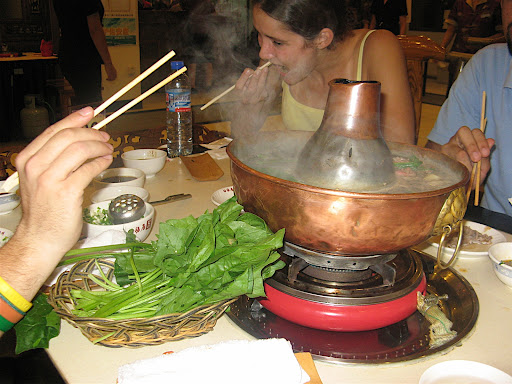 our hostel, we napped briefly and set out to discover another one of China’s most well known restaurants. The name escapes me, but it is a nation-wide chain of Mongolian hot pot. Hot pot consists in, no surprise, a pot of boiling water set in the middle of a table, seasoned with vegetables and spices. Into this mixture, you dip all sorts of vegetables, meats, etc and wait for them to cook before dipping them into a variety of delicious sauces and eating them. Wow – the meat, the spinach, and the potatoes we ordered constituted one of the best meals I had in China. The rest of the afternoon was spent walking around, exploring random parts of the capital. We discovered that everything seems to be under construction, which comes as no surprise as the city gears up for the 2008 Olympics. Beijing seemed somewhat calmer than Shanghai, despite the massive amounts of people everywhere and the smog hanging, literally, on the tops of buildings. This must be, at least in part, because it is not as finance and business oriented and focuses a lot more on it’s ancient history. Andrew remarked that Beijing had already seen its height as a city, whereas Shanghai was just reaching its peak.
our hostel, we napped briefly and set out to discover another one of China’s most well known restaurants. The name escapes me, but it is a nation-wide chain of Mongolian hot pot. Hot pot consists in, no surprise, a pot of boiling water set in the middle of a table, seasoned with vegetables and spices. Into this mixture, you dip all sorts of vegetables, meats, etc and wait for them to cook before dipping them into a variety of delicious sauces and eating them. Wow – the meat, the spinach, and the potatoes we ordered constituted one of the best meals I had in China. The rest of the afternoon was spent walking around, exploring random parts of the capital. We discovered that everything seems to be under construction, which comes as no surprise as the city gears up for the 2008 Olympics. Beijing seemed somewhat calmer than Shanghai, despite the massive amounts of people everywhere and the smog hanging, literally, on the tops of buildings. This must be, at least in part, because it is not as finance and business oriented and focuses a lot more on it’s ancient history. Andrew remarked that Beijing had already seen its height as a city, whereas Shanghai was just reaching its peak.
At night we went to Beijing’s famous night market street, where locals and tourists alike gather to bargain shop, drink a couple of beers, and eat the street food if they’re brave, or stupid, enough. I bargained expertly and bought a couple of sandalwood fans and art pieces, while nearby by-standers stared at the crazy white girl who would not budge on her price! I must say that for the purpose of bargaining I always pretend to speak mostly Spanish. First, because it helps to not be from the US and second because the seller likes you more if your English is as bad as theirs. This liking either quickly dissipates when they realize that, despite the language barrier, you are not a stupid tourist, or increases when you begin laughing and calling them “friend.”
The high point of the night market was our consumption of fried scorpion. Yes, fried scorpion. They were alive before our eyes, then fried on a stick, and handed to us to eat. They are apparently a delicacy. The taste was crunchy and I was so intently focused on swallowing that I’m not sure if my palate registered any flavor! Beaming with pride from our culinary escapade, we made our way to the lakes region again, only to discover that the quiet, reserved quays had turned into the hub of nightlife in Beijing. The sides of the lake were overrun with outdoor cafes, bars, restaurants, full of people enjoying the evening breeze, the bright lights reflected in the water, and the variety of music. Of all the places where I have seen nightlife (though they have not been many), this has my favorite. The atmosphere is relaxed, the windows of every building are open, there doesn’t seem to be a clear distinction between indoors and outdoors, and the water adds a touch of serenity to the loud music and crowds of people.
After enjoying a drink in one of these establishments, we headed back to our hostel and were asleep before our heads even reached the pillows.
DAY 3: FLOWERS AND FREEDOM
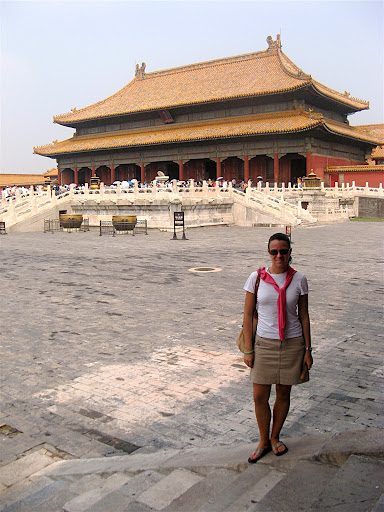
The third and last day of our stay in Beijing went by quickly. We started the morning by spending several hours inside the Forbidden City, which I personally found to be completely anticlimactic. The structures had not been renovated in quite some time, the museums had a dearth of artifacts, and there didn’t seem to be a lot to, well, see. My favorite part was at the very beginning, having walked through the Meridian Gate, and walking across the five marble bridges, symbolizing the five cardinal virtues of Confucianism. The symbolism of Chinese architecture and design is an aspect that I found particularly enjoyable about my entire trip to the country. For me, the most impressive aspect of the Forbidden City was that it remained the seat of imperial power until less than 100 years ago and that even after a successful revolution, the emperor had been allowed to reside there for several more years. The complex was not fully opened to the public until 1949!
Note: the portrait of General Mao on the outside wall is just as large and pristine as I imaged it would be, looming over those who enter the palace as some kind of Supreme observer. Having walked outside, we crossed the street to Tian’an men Square, a vast concrete expanse in the heart of modern Beijing. It is said to be the largest public square in the world and is flanked by a series of the most Soviet buildings I had the chance to see in the entire city. On the far end, flanked by statues, is Chairman Mao’s mausoleum, but we could not see the casket because his body [or the casket, it was unclear] is currently undergoing some kind of restoration work for next summer’s Olympic games. What one could do to an embalmed corpse to make it look more presentable is beyond me.
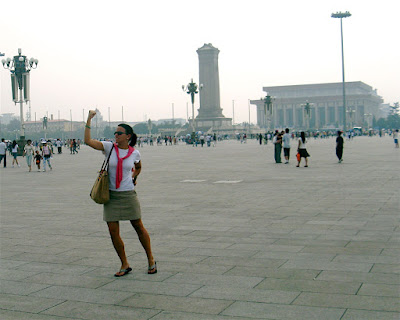
After this sight seeing, we met up with Ami at the Beijing Hotel, one of the most expensive and fancy hotels in the city. We were meeting Ami’s family friend, Mr. Yang, and his daughter for lunch. We went to some kind of buffet restaurant inside the hotel that must have cost Mr. Yang upwards of $70 a meal per person. And that’s just my modest estimate. Mr. Yang quietly nudged us by saying, “This food is expensive, so eat a lot,” but we did not need any encouragement. All of his, starved from our cheap and small portions, devoured this food like a pack of wild, but neatly dressed animals. I had, in order: a salad, cheese, sashimi, homemade noodles, fried ride, prime rib, grilled salmon, scalloped potatoes, fruit, and a slice of every single dessert they had. In short, I ate like a fat man undergoing a mid-life crisis.
The highlight of the lunch, however, was getting to talk to Mr. Yang, who proved to be an enjoyable and kind host. At some point, he began explaining to us the role of alcohol in Chinese business. He began by claiming that, “You must lubricate a business with drinking” and the enigmatic statement, “Alcohol in China is like fire.” He then proceeded to explain that you should commit to either drink nothing or drink more than your opponent from the very beginning of structuring a business deal…if you start drinking a little, the other party will pressure you to drink more and more until, well, you start making unwise decisions. Mr. Yang, laughing so hard he could barely speak, told us, “Three times, I almost died at business.” Presumably he meant alcohol poisoning! After referring to himself as “Mr. Beer” because he prefers beer to hard liquor, he proceeded to expound the virtues of some women in business that, to his surprise, can drink more than men. His hypothesis was that they must have some kind of biological imbalance. His explanation was as follows: “Some chemical women drink more than men.”
When I thought that I could not be eating more or laughing any harder, Mr. Yang and I began a conversation about sizes in China and the US. He told me that he believed that everything in the US was bigger than in China; I said I disagreed. His examples hinged on the dumplings served in restaurants and the size of flowers. I couldn’t comment on the former, but I said that the latter was probably due to fertilizers and other artificial ingredients. At thi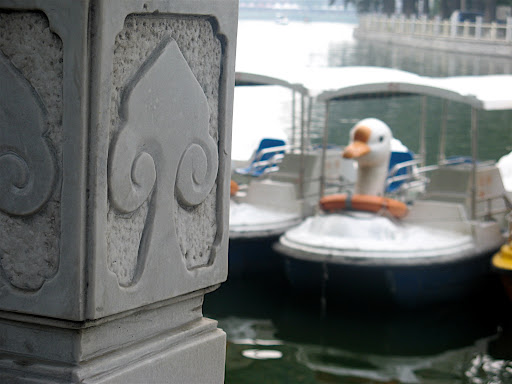 s point, Mr. Yang’s daughter who was sitting directly to my left and across from her father said, “Maybe in America flowers are bigger because they have more freedom to grow.” Andrew and I exchanged nervous glances, which were immediately alleviated by Mr. Yang’s roaring laugher. “Freedom….hahaha…freedom to grow!!!,” he yelled, and the rest of us joined the laughter about the innocently sarcastic comment about their own homeland.
s point, Mr. Yang’s daughter who was sitting directly to my left and across from her father said, “Maybe in America flowers are bigger because they have more freedom to grow.” Andrew and I exchanged nervous glances, which were immediately alleviated by Mr. Yang’s roaring laugher. “Freedom….hahaha…freedom to grow!!!,” he yelled, and the rest of us joined the laughter about the innocently sarcastic comment about their own homeland.
We ended the day by picking up our tailored clothes, packing, buying some porcelain, hand-painted tea sets, and heading back to Shanghai on another overnight train. On the way to the train station I noticed that there are so many KFCs in Beijing that the Colonel almost begins to look like a Chairman Mao caricature, penciled in white against a suspiciously red background. I wondered again about how much of the westernization of China’s cities is desirable, how much of this is really “progress” versus a melding of cultures versus a taking advantage of something.
 Lyrics: This is ten percent luck, twenty percent skill, fifteen percent concentrated power of will, five percent pleasure, fifty percent pain" - Fort MinorAfter SATP, we had a week off to travel before HSYLC began. This program is much larger than SATP, including many Chinese college students as volunteers, a larger staff, and 40 Harvard Seminar Leaders. The concept of HSYLC is quite an exciting one: get a bunch of qualified Harvard students to teach small seminars on topics that Chinese students are not typically exposed to. The students have to apply to the program and, since the selection process includes an essay, their English proficiency is typically higher than that of the SATP kids [not baby goats, I mean students]. My seminar was titled “The Human Experience Through Literature: How Soviet Russia was Constructed,” and focused on the strong links between literature from that time period and the cultural, political, and economic reality of the time. The main works were several poems and a short novel, “Heart of a Dog” by Mikhail Bulgakov, and the central portion of the class hinged on discussions among the students on different themes and questions. On the last day, we also had two debates on moral issues touched on in the novel. All in all, I found the experience to be very rewarding, but exhausting. I probably should have chosen a topic that required less background knowledge or that relied less on discussion skills that were unfamilia
Lyrics: This is ten percent luck, twenty percent skill, fifteen percent concentrated power of will, five percent pleasure, fifty percent pain" - Fort MinorAfter SATP, we had a week off to travel before HSYLC began. This program is much larger than SATP, including many Chinese college students as volunteers, a larger staff, and 40 Harvard Seminar Leaders. The concept of HSYLC is quite an exciting one: get a bunch of qualified Harvard students to teach small seminars on topics that Chinese students are not typically exposed to. The students have to apply to the program and, since the selection process includes an essay, their English proficiency is typically higher than that of the SATP kids [not baby goats, I mean students]. My seminar was titled “The Human Experience Through Literature: How Soviet Russia was Constructed,” and focused on the strong links between literature from that time period and the cultural, political, and economic reality of the time. The main works were several poems and a short novel, “Heart of a Dog” by Mikhail Bulgakov, and the central portion of the class hinged on discussions among the students on different themes and questions. On the last day, we also had two debates on moral issues touched on in the novel. All in all, I found the experience to be very rewarding, but exhausting. I probably should have chosen a topic that required less background knowledge or that relied less on discussion skills that were unfamilia r to students whose only academic exposure has been to the Chinese educational system. I think the students enjoyed the different pace and focus of my seminar, or at least I hope they did. Each teacher also had a Course Assistant, which I found somewhat overwhelming, but very useful…Sophie was incredible and translated some of the more difficult concepts that I was introducing.Other than this, each Seminar Leader was also in charge of a writing workshop, an extracurricular activity, and a proctor group. In short, we were working all day, every day. The writing workshop focused on persuasive and personal essays, and I really enjoyed structuring and leading those lessons; unlike my literature class, I didn’t feel pressed for time and was relaxed enough to make jokes, act things out, and write on the board. My extracurricular activity was salsa dancing, which I think we all had a lot of fun with, despite the obvious lack of rhythm of some of my students. I tried to focus on enjoyment, not skill, so I think that if nothing else, they had some time to laugh and learn to swivel their hips! My favorite part of the day was my proctor group, where I could just let loose and be more of a companion than a teacher. Proctor group attendance was completely voluntary, but I put my students though so many games, charades, dancing, and spontaneous activities, that they all came every single time. We even had some migration from other groups! My favorite activity was the one time we played truth or dare. Seated in a circle on the floor, I warned then that the questions and dares had to be decent. In the first two questions, we discovered that one of the students had a crush on a Course Assistant! The next girl chose a dare and immediately the class went wild. Soon, we were invading a nearby classroom in a fury of clapping and screaming and, huddled by the door, watching her walk up to another student and ask him for a hug. At this point, the students in t
r to students whose only academic exposure has been to the Chinese educational system. I think the students enjoyed the different pace and focus of my seminar, or at least I hope they did. Each teacher also had a Course Assistant, which I found somewhat overwhelming, but very useful…Sophie was incredible and translated some of the more difficult concepts that I was introducing.Other than this, each Seminar Leader was also in charge of a writing workshop, an extracurricular activity, and a proctor group. In short, we were working all day, every day. The writing workshop focused on persuasive and personal essays, and I really enjoyed structuring and leading those lessons; unlike my literature class, I didn’t feel pressed for time and was relaxed enough to make jokes, act things out, and write on the board. My extracurricular activity was salsa dancing, which I think we all had a lot of fun with, despite the obvious lack of rhythm of some of my students. I tried to focus on enjoyment, not skill, so I think that if nothing else, they had some time to laugh and learn to swivel their hips! My favorite part of the day was my proctor group, where I could just let loose and be more of a companion than a teacher. Proctor group attendance was completely voluntary, but I put my students though so many games, charades, dancing, and spontaneous activities, that they all came every single time. We even had some migration from other groups! My favorite activity was the one time we played truth or dare. Seated in a circle on the floor, I warned then that the questions and dares had to be decent. In the first two questions, we discovered that one of the students had a crush on a Course Assistant! The next girl chose a dare and immediately the class went wild. Soon, we were invading a nearby classroom in a fury of clapping and screaming and, huddled by the door, watching her walk up to another student and ask him for a hug. At this point, the students in t he other class, jumped up and clapped with us! After the hug, we all ran back to our own classroom, laughing and tripping over each other. We also found out that this was her first hug with a boy, and I wondered, briefly, if I was corrupting my children! The next dare was by far the highlight of the day and became the talk of the staff for at least two days. The boy was dared to propose to a random girl so, again, we invaded another classroom, much to the chagrin of their proctor. My students were shaking and shrieking by the door. I was shamelessly taking paparazzi style pictures in the front. The poor boy knelt and, with one of my rings, asked the girl for her hand in marriage. She calmly took the ring and accepted, at which point both classes erupted into a frenzy of screams, laughter, hugging, and running. It was clear that it was a joke, but I think in that one moment they all released much of the stress they’d been accumulating over the previous week. I was more than happy to help, even if a little corruption was involved!Aside from all of their other programs, the students were also involved in something called ATVenture, which stands for Action for Tomorrow Venture. The students formed teams and worked to develop and implement a plan to produce an effective and feasible solution to a pressing societal problem. Under our guidance, they attended workshops and worked on their critical thinking, p
he other class, jumped up and clapped with us! After the hug, we all ran back to our own classroom, laughing and tripping over each other. We also found out that this was her first hug with a boy, and I wondered, briefly, if I was corrupting my children! The next dare was by far the highlight of the day and became the talk of the staff for at least two days. The boy was dared to propose to a random girl so, again, we invaded another classroom, much to the chagrin of their proctor. My students were shaking and shrieking by the door. I was shamelessly taking paparazzi style pictures in the front. The poor boy knelt and, with one of my rings, asked the girl for her hand in marriage. She calmly took the ring and accepted, at which point both classes erupted into a frenzy of screams, laughter, hugging, and running. It was clear that it was a joke, but I think in that one moment they all released much of the stress they’d been accumulating over the previous week. I was more than happy to help, even if a little corruption was involved!Aside from all of their other programs, the students were also involved in something called ATVenture, which stands for Action for Tomorrow Venture. The students formed teams and worked to develop and implement a plan to produce an effective and feasible solution to a pressing societal problem. Under our guidance, they attended workshops and worked on their critical thinking, p roblem-solving, and presentation skills. In the end, each team had to have a comprehensive solution to present in a symposium. The winning proposal received 10,000 Yuan to make their idea a reality. My favorite idea was one that collected the remains of harvests and found different ways to recycle them. These projects pushed the students to think of local activism, to stay up until 3am coming up with innovative ideas, and to really believe that even at their age they came. It was great to watch them go through this!At the end of the weeklong HSYLC program, we had two events for students: a talent show and an ice cream bash. For the talent show, the students came prepared with their instruments, from modern violins to the traditional guzhengs. They sang traditional Beijing opera, performed magic tricks with fire, staged a modern Romeo and Juliet, and performed modern songs along with dance numbers, guitar accompaniment, etc. The showcase took five hours! Tracy and I performed a dance with three students, in which Tracy taught us a hip-hip routine to Fort Minor’s “Remember the Name” and I taught a step routine that I half borrowed from my freshman year and half, surprisingly, made up. This was so much fun, but the highlight of the night was the choreography we did for the a Teacher/CA rendition of the Backstreet Boys’ “I want it
roblem-solving, and presentation skills. In the end, each team had to have a comprehensive solution to present in a symposium. The winning proposal received 10,000 Yuan to make their idea a reality. My favorite idea was one that collected the remains of harvests and found different ways to recycle them. These projects pushed the students to think of local activism, to stay up until 3am coming up with innovative ideas, and to really believe that even at their age they came. It was great to watch them go through this!At the end of the weeklong HSYLC program, we had two events for students: a talent show and an ice cream bash. For the talent show, the students came prepared with their instruments, from modern violins to the traditional guzhengs. They sang traditional Beijing opera, performed magic tricks with fire, staged a modern Romeo and Juliet, and performed modern songs along with dance numbers, guitar accompaniment, etc. The showcase took five hours! Tracy and I performed a dance with three students, in which Tracy taught us a hip-hip routine to Fort Minor’s “Remember the Name” and I taught a step routine that I half borrowed from my freshman year and half, surprisingly, made up. This was so much fun, but the highlight of the night was the choreography we did for the a Teacher/CA rendition of the Backstreet Boys’ “I want it that way.” Chen, Alex, Dan, David, Eddie, Viola, Lisa, Ami, and I danced our little hearts out on stage and then had students come up to dance on the next song. The crowd was on their feet clapping and it all went over as a huge success! Our boy-band tribute was hilarious, and, complete with running-fingers-through-hair, cheesy choreography, sunglasses, I am posting it as a video below.The ice cream bash as, again, an insane event. The students, shy as always, refused to dance and needed a LOT of prodding to get their bodies moving. In short, Hannah, Chine, and I ended up being hoisted up on the cafeteria’s tables. Eventually, after the students stopped cheering and frantically taking pictures, they began dancing themselves. In a bit, after some dance-offs and other activities, the students could be left to dance alone. We had succeeded, though again, some corruption may have been involved!HSYLC was a great experience, though time was limited and we didn’t have the opportunity to
that way.” Chen, Alex, Dan, David, Eddie, Viola, Lisa, Ami, and I danced our little hearts out on stage and then had students come up to dance on the next song. The crowd was on their feet clapping and it all went over as a huge success! Our boy-band tribute was hilarious, and, complete with running-fingers-through-hair, cheesy choreography, sunglasses, I am posting it as a video below.The ice cream bash as, again, an insane event. The students, shy as always, refused to dance and needed a LOT of prodding to get their bodies moving. In short, Hannah, Chine, and I ended up being hoisted up on the cafeteria’s tables. Eventually, after the students stopped cheering and frantically taking pictures, they began dancing themselves. In a bit, after some dance-offs and other activities, the students could be left to dance alone. We had succeeded, though again, some corruption may have been involved!HSYLC was a great experience, though time was limited and we didn’t have the opportunity to
get to know the students as well as during SATP.
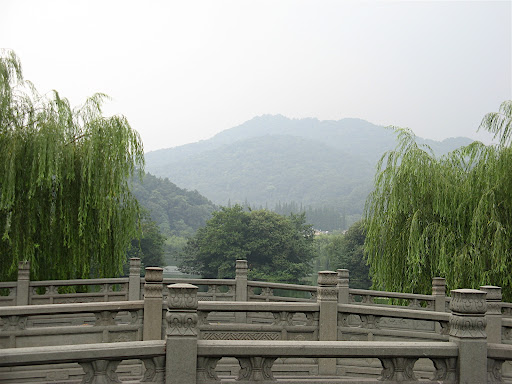 Lyrics: The promise of rain can be heard on the breeze – Jonathan Rice
Lyrics: The promise of rain can be heard on the breeze – Jonathan Rice
Upon John’s and mine return, like prodigal children crawling back to polluted and hot Shanghai from the more polluted and hotter Nanjing, we took a day trip with Eric and Lisa to Hangzhou.
On that morning Eric, always the parental figure in the group, brought us some street-bought deliciousness for breakfast, and we headed out. The train ride was short and in less than two hours we found ourselves in one of China’s most famous cities. It didn’t seem particularly impressive, especially coming from Shanghai – the Porsche dealership was boring and there were no massive skyscrapers – but the natural beauty, the way that elements of life, and water especially, has a place in the city, was incredibly refreshing. I had not realized how much I had needed to see a mountain, or walk by water that did not smell like sewage until I stepped out of the cab from the train station and found myself facing, not 30 yards away, the West Lake (Xi Hu), stretching for over three square miles in the middle of a metropolitan city. Later, surrounded by green hills, strolling along the willow-shaded causeways and side by side with lotus blossoms upon lotus blossoms, I felt like I had a better understanding of why Marco Polo had been interested in becoming governor of this city [It is unclear whether Marco Polo ever actually set foot in Hangzhou, but my travel guide said so and I didn’t mind adding a whimsical touch to the adventure, false although it may have been]. What is remarkable is the presence of nature IN the city: it’s not the mere growing of shady trees along the streets, or the parks that feel like an tropical oasis, but the fact that off of the busiest road, you can step off down a wooden or stone plank or walkway and be instantly surround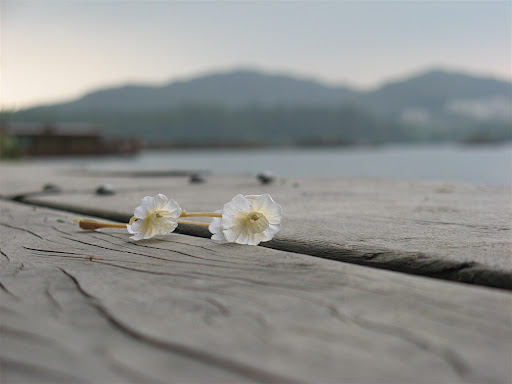 ed by whispering trees and rustling water. I’ve never seen nature so well incorporated into a city before.
ed by whispering trees and rustling water. I’ve never seen nature so well incorporated into a city before.
Looking for a place to have lunch, we stumbled into a hole-in-the-wall establishment run by, of all things, Chinese Muslims! When people, myself included, usually think of China, I doubt it comes to mind that, aside from languages and cultural differences, the variety of ethnic groups is truly astounding. For instance, admitting my blatant ignorance, I was surprised to find that there are more than 20 million Muslims in China! And we were in the presence of several of them. All the workers of the restaurant seemed to belong either to the same family or to a tightly knit small group. They were also all rather young and male. The men were cooking, serving, and kneading the dough, so we wondered where exactly the mothers and wives of these people were.
In any case, they stared at us under their kufis [what is the plural of Kufi?], and the establishment’s other patrons all turned from their meals to look at the two white people who had just walked in with two young people who were probably their interpreters. Dismissing all possible awkwardness (after all, this was a noodle restaurant, and there is next to nothing I will not do for a good plate of carbohydrates), I pushed for us to sit down. We ordered and discussed how the tables next to us were talking about us. Soon, it became apparent that our random choice of restaurant had been a lucky one: the noodles were homemade. Every piece of pasta that was served had just been mixed, kneaded, “whipped,” cut, and then boiled about ten feet away from us! Needless to say, the food was delicious. It also cost less than $2.
After a very satisfying lunch, we found a small shop that rented bicycles for a couple of hours, intending to go around the lake. I stopped briefly to consider how happy I was to have tackled my bike-riding inadequacies months ear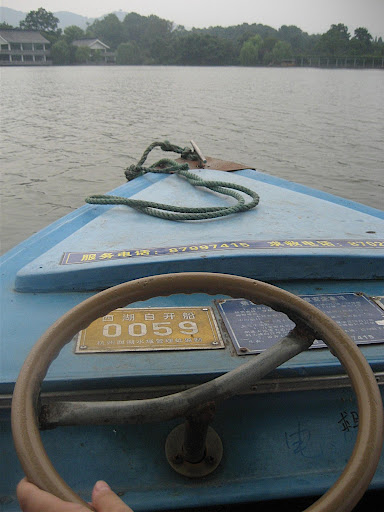 lier, and we were off! The first part of the biking trip was a bit of a rollercoaster. On the one hand, I was ecstatic to be riding a bike again after two weeks of not being on one and happy to be seeing the city from this previously unknown to me mode of transportation. On the other hand, Chinese drivers seem to be either: (a) drunk, (b) driving a woman who is desperately in labor, has an urgent need to get to the hospital in the next 5 seconds, and does not care that there is a red light, (c) foaming at the mouth from anger, desperation, or something that looks suspiciously like rabies. In other words, the apocalypse was coming and we were trying to bike through it. It is also worth mentioning that I was wearing a skirt, which, despite being knee-length, probably afforded some pedestrians more than I had intended to share.
lier, and we were off! The first part of the biking trip was a bit of a rollercoaster. On the one hand, I was ecstatic to be riding a bike again after two weeks of not being on one and happy to be seeing the city from this previously unknown to me mode of transportation. On the other hand, Chinese drivers seem to be either: (a) drunk, (b) driving a woman who is desperately in labor, has an urgent need to get to the hospital in the next 5 seconds, and does not care that there is a red light, (c) foaming at the mouth from anger, desperation, or something that looks suspiciously like rabies. In other words, the apocalypse was coming and we were trying to bike through it. It is also worth mentioning that I was wearing a skirt, which, despite being knee-length, probably afforded some pedestrians more than I had intended to share.
After biking almost halfway around the lake and making a couple of sightseeing stops [we still had the Giant Buddha Temple to go, AND the tea farm that Eric had promised me…make a mental note of this for later], we heard the unmistakable clash of nearby thunder. We had previously rented a miniature boat and taken it VERY slowly around a miniature lake in one of the most anticlimactic experiences of the trip. It was, however, hilarious because (a) I was steering the vessel, and (b) people in other boats laughed at us for no discernable reason. Now, I looked up to see that the beautiful green color of the mountains surrounding the city looked all the more poignant against the dark grey backdrop. That moment before a storm when everything looks brighter and the hues of trees and flowers are accentuated by the oncoming darkness has alw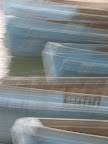 ays been one of my favorite things about rain.
ays been one of my favorite things about rain.
Eric, staying true to his parental figure nature, packed our few precious belongings into his Swiss Army backpack and covered it up with some kind of incredibly cool rainproof hood. A bag with a hood, leave it to the Swiss to think of some neat-o little thing like that.
Soon, there we were, in the middle of a torrential downpour. It was an all-out monsoon, or at least what I would think of if the word “monsoon” ever came to mind. The rain was slanting, my contacts were moving and my vision was blurred, my body was completely soaked, but, feet firmly planted in my pedals, water pouring down my face, bike skidding at every turn, I couldn’t help but smile. I was biking. In the rain. In China. Even if only for the forty-five minutes we spent in our insane battle against the elements, smiling at each other, being pointed out by all of the reasonable citizens who had sought shelter, the past couple of months floated up and away, and life seemed full. Full. Brimming with surprises, boiling over with moments of fulfillment, joy, and instantaneous laughter. We arrived in time to return our bikes, squeezed some water from our clothes, and embarked on a search for food, envigorated by our adventure! Our bike renters recommended a tea house that was a couple of blocks away after we asked them to recommend a place that allowed completely soaked people in for a sit-down meal. As we walked up to the restaurant, a caught a glimpse of a woman who had just gotten out of a BMW walking into said restaurant, and burst out laughing. Yes, surely we were going to be allowed inside, with the boys in their wife-beaters, Lisa’s blue underwear peaking through her now-transparent white skirt, and me, constantly twitching my eyes to readjust my contacts in an odd, slightly insane gestures.
I was proven wrong. The hostess not only seated us (granted, in a far away corner booth), but also brought us a prized gift: a blow dryer. That early evening we ate to our heart’s content: the buffet of authentic Chinese food constituted one of the best meals I was to have in that country during my entire stay. The vegetables in particular were incredible: edamame, oriental cucumber , white choi sum, pei tsai – ah, any Asian market near where I live in the future is going to know me as a frequent customer after this! And the fruit, ah the fruit! Star fruit, dragon fruit, lychees, etc. It was an incredible all-you-can-eat spread and the tea which we ordered to accompany it was of similar quality. We sat and chatted, happy to be drying off, happy to have come.
, white choi sum, pei tsai – ah, any Asian market near where I live in the future is going to know me as a frequent customer after this! And the fruit, ah the fruit! Star fruit, dragon fruit, lychees, etc. It was an incredible all-you-can-eat spread and the tea which we ordered to accompany it was of similar quality. We sat and chatted, happy to be drying off, happy to have come.
We headed home to Shanghai on the evening train. It didn’t matter that I had not seen the Giant Buddha in the temple or that the tea farm had remained unvisited. There will be other summers for that, hopefully soon. But having all of the tired, all possibly sad feelings lifted to be refreshed by rain, by bikes, by beautiful landscapes, by friends – that moment probably wouldn’t have happened in the same way at any other time or any other place.
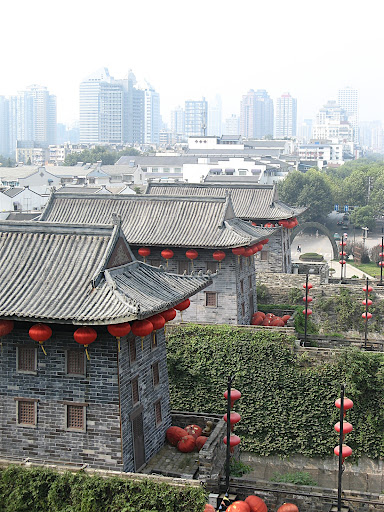 Lyrics: Sometimes all it takes is a leap of faith – Etta James
Lyrics: Sometimes all it takes is a leap of faith – Etta James
After two weeks of SATP, we had a week off before HSYLC started, so John and I headed over to Nanjing.
Nanjing was the capital of several regional kingdoms many centuries ago, as well as during the 19th Century Taiping Heavenly Kingdom and the first Chinese Republic under Dr. Sun Yat Sen. It is also an incredibly modernized and developing city, though, like all big cities in China, poverty lives next door to skyscrapers. In any case, Nanjing is also of China’s “Oven Cities,” and on the morning of our arrival it greeted us with 42 degrees Celsius (107 Fahrenheit). The polluted, humid, and dense air was a slap in the face even after dealing with Shanghai for two weeks. Note: According to the World Bank, 16 of the world's 20 most polluted cities are located in China. Having previously decided to be spontaneous and adventurous, we had not booked a hotel, so when I sat in the front seat of our cab and pointed to the Chinese characters for “hostel” in my guidebook, I knew we were in for a treat. Our cabbie – surprisingly, a woman – at first thought we were crazy, but later drove us around until we found a hotel that was reasonably priced. I paid and snuck John in behind me so that we could have the cheaper, smaller room. Our hotel room left a lot to be desired, as you will notice from my pictures: the ceiling was leaking, the lamps were burned, the carpet was questionable, the toilet was not flushing. However, the staff did provide us with thin terrycloth-ish slippers, which was enough for me!
Of the two days we spent in Nanjing, the first was definitely the worse of the two. Stifled by the heat, we managed to drive across the entire city to see Zhonghua Gate. This is part of the wall structure that used to surround the capital and was built under the first Ming emperor in the 1380s. The remains are rather impressive in that they are so ancient and well preserved, but I was not impressed by the now-electric lanterns that had replaced the traditional, cloth ones. In addition, the view from the top was severely limited by the smog in the distance, the museum did not have English translations, and there was little to admire other than the structure itself. The rest of the day was spent trying to find our way to different temples, unsuccessfully because streets in Nanjing do not have Pinyin transliteration and people do not speak English. The heat was oppressive, the city was not particularly clean, and we did not see most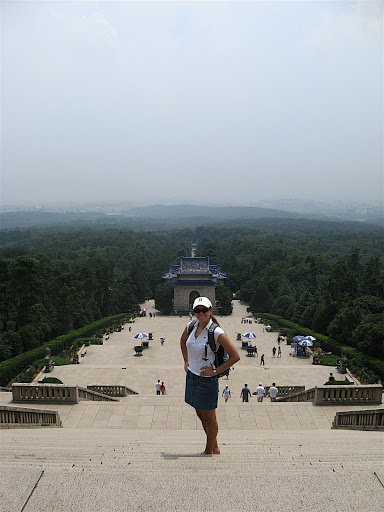 of what we had intended to. Devastated, both by the first day and the last two weeks of round-the-clock teaching, we went back to our hotel room and slept for 12 hours.
of what we had intended to. Devastated, both by the first day and the last two weeks of round-the-clock teaching, we went back to our hotel room and slept for 12 hours.
In the morning, however, we emerged victorious, after a rather long taxi ride, on Purple Mountain! Zijin Shan, as it is called in Chinese, overlooks the city and is a picturesque area of green hills, bamboo groves, and little villas. The main point of interest on the entire mountain is Dr. Sun Yat Sen’s Mausoleum, which both John and I had been excited about seeing.
The Dr. is an incredibly well known Chinese revolutionary and political leader. He is referred to as the "father of modern China" because he guided the overthrow of the Qing Dynasty in 1911 and led the founding of the first Republic of China. He united post-imperial China as best as he could and, surprisingly is respected not only in mainland China, but also in Taiwan. After he died in 1925, a competition was held to design his tomb. Interesting enough, Y.C. Lu, a graduate from Cornell’s School of Architecture, won the contest. The entire structure is magnificent! Ascending a hill with 392 steps is a long marble stairway, intersected at times with beautiful buildings crowned with blue-tile roofs. At the top, sits the mausoleum and, inside, lies the sarcophagus, inset in the floor. John and I made our way to the top, stopping to take a couple of pictures along the way, and were disappointed to see the attitude people took at the Mausoleum. Surprisingly, the overwhelming majority of the tourists were Chinese; I’m not sure if we even saw another white person on the way up, though we saw a couple on the way down. In any case, inside the room where the sarcophagus lay, people were chatting, laughing, talking, which struck me as a drastic contrast to my experience in Lenin’s mausoleum in Moscow, where no pictures are allowed and total silence is enforced. You can almost hear his nails still growing (On a side note, I hope someone has clipped them since I last was there). It was strange to me that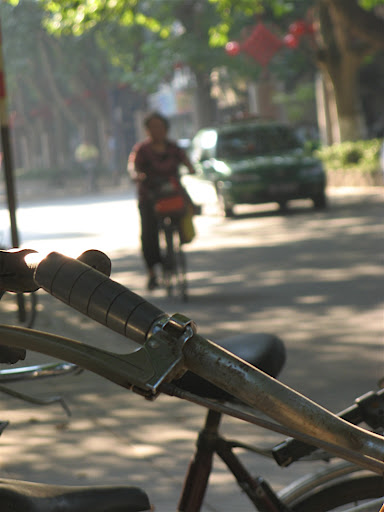 for a nation that is so proud of its history, these people would so blatantly disrespect the tomb of such an important figure.
for a nation that is so proud of its history, these people would so blatantly disrespect the tomb of such an important figure.
After our descent, John and I walked around other areas of the mountain for a bit, exploring, among other things, the Linggu Pagoda. It was designed, strangely enough by an American, in memory of the soldiers killed in the 1911 revolution. The view from the top was incredible: just green mountains rolling as far as I could see.
After our exploration of Purple Mountain, John and I headed back to the train station. Despite my genuine enjoyment of Purple Mountain, the trip had been somewhat anticlimactic for me, less because of the heat and the dingy hotel room, and more because the city seemed like a lesser version of Shanghai: a polluted, bustling metropolis, but without the striking architecture or interesting sights. And so we headed home. Home to Shanghai. It was strange to use the words “home” and “Shanghai” together, but it worked. When we got off the platform, I felt good, ready to tackle the large taxi line, ready to return to whatever semblance of routine I had established during the past two weeks. For now at least, Shanghai really was home.


